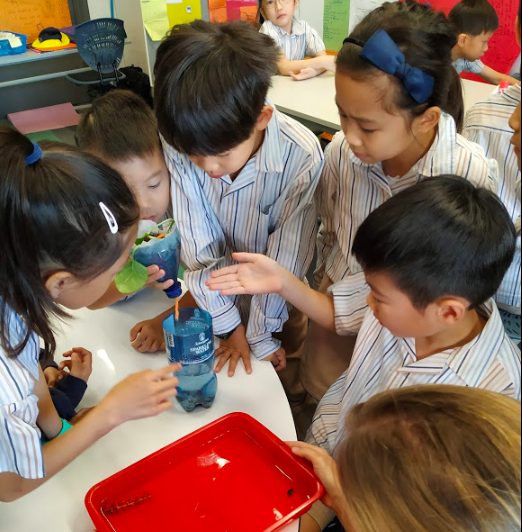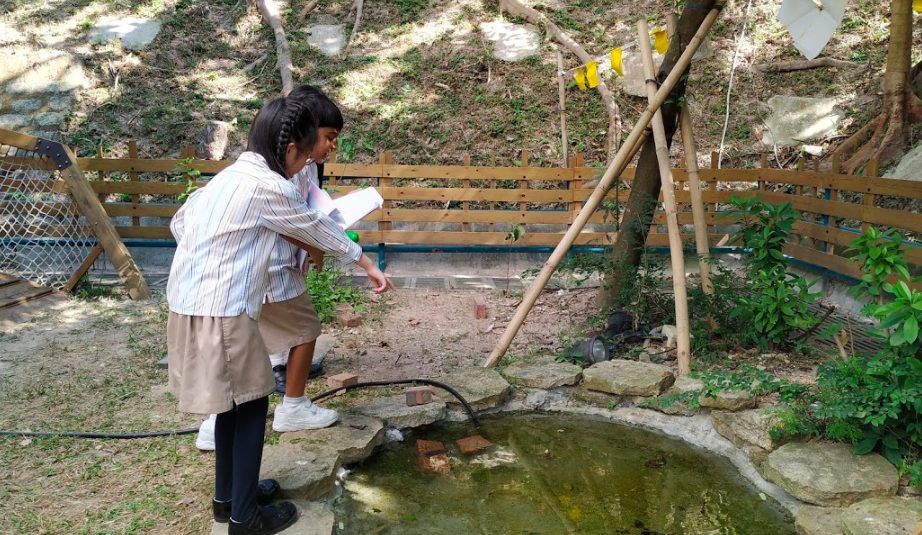Yr4 Curriculum Update – 29/11/19
Working together to achieve success for every child

Sharing the Planet
Central idea:
Living things survive and thrive in specific ecosystems.
Lines of inquiry:
- Adaptation and ecosystems (form)
- Why living things survive and thrive in specific ecosystems (causation)
- Human impact on ecosystems (responsibility)
We have been enjoying diving straight back into our inquiries about what makes an ecosystem and why adaptations have helped plants and animals survive. Here are some reflections about the learning experiences throughout Year 4 .


We went to KJS’s Secret Garden to investigate an ecosystem. We did a see, think and wonder. I saw 19999 snail shells and a decomposing wood log and a pond. After we visited the secret garden we wrote about I see, think, I wonder, then we sorted the questions into groups, the whole class wrote on different things.
By Josh and Nahyun 4C
After we had visited the secret garden, we found many things to write about. We created questions for our wonder wall, then sorted the questions into groups. The groups are: What does ecosystem and adaptation mean? What makes living things survive and thrive in specific ecosystems? and what is our responsibility to maintain ecosystems? We made this wonder wall so people can answer them. There were also many cool things over there!

We made an ecosystem in a bottle.We added a snail, a spoon of gravel, soil, a piece of coffee filter, a plant, weed, water and importantly a bottle. We understand that the snail gives the nutrients to the water and the water travels up to the thread to the soil then the plant will be healthy.
By Airi and Esther 4C
We learned how to do a scientific sketch of our ecosystem in a bottle. The drawing must be accurate, big, colorful and detailed. First we had to draw the outline with dots. Then, we joined the lines together. We had to draw everything we saw instead of what we thought we saw. There were a few plants, soil and a freshwater snail. We coloured it accurately with the right colours. We drew a “zoom in part”. The “zoom in part” showed what we thought was interesting. We also labeled our drawings. We had to write down if it is a producer, consumer or decomposer. We also had to label if it is living or non living.
By Hazel and Jayden 4C
We also invited Mr Melsom into school, who is an expert in all things environmental. He shared with us how we can help wildlife conservation in Hong Kong.
We cannot wait to get started on our own independent inquiries about ecosystems, animal or plant adaptations and maybe even our responsibility to maintain these ecosystems. We are definitely going to try to use a scientific sketch and explain our understanding of an ecosystem.

Literacy
During our literacy inquiries we have been finding out how we know what is important when reading and researching. There is often so much information! So we have been focusing on finding the interesting facts, our responses (inner voices) about those facts and any questions this makes us think about. We have also been learning how to take notes ready for when we begin researching into our independent inquiries. Here is one method:
We have been learning how to take notes. One way is to take notes is to make a word web.
Another way to take notes is to use see, think wonder or Think 1 and 2.
By Fedela and Sophie 4C
A word web is a method where we read a chapter or page. We then scatter the key words from that reading around our page. We then try to join two or more key words which we connect with a sentence. This really helps us to think about what we read without copying the words from the book.
We are also beginning to organise our writing into paragraphs. We have analysed what makes an effective paragraph and how they are organised. Using this criteria we will be practising grouping our ideas into paragraphs, which we will then apply when we share our findings from our Unit of Inquiry.
Maths
Throughout the last couple of weeks we have moved our inquiries of the Four Operations from addition and subtraction into multiplication and division.
Central idea:
The four operations are connected to each other and are used to solve problems.
Lines of inquiry:
- Recognizing what operation is needed to solve a problem (form)
- How various strategies work to solve multiplication and division problems (function)
- How multiplication and division are connected (connection)
We shared our various mathematical strategies which we use in the class. Here are some learning engagements which help us share and explain our thinking:
We have been learning different addition and subtraction strategies to find different ways to make the answer. Then we made the video on flip grid. Some children did compensation and some people did mental strategies. We need clear voice when we talk on flip grid.
By Aidan and Tristan 4C
We did a ‘Number talk’ to see how many different strategies we came up with when we had to solve the sum of 15X6. We came up with 6 strategies. These are the strategies we came up with: Taksh’s strategy, repeated addition(Vandita’s) strategy, Esther’s strategy (grid method), Column strategy (Tanya’s strategy), Drawing ‘groups of’ as a visual (Rhiyoo’s strategy), Partitioning (Deesan’s strategy). We recorded our strategies of how to make 15X6 on flipgrid. We had a lot of fun recording on flipgrid.
By Vandita & Tanya
We have also been closely checking in with how we are feeling during the last couple of weeks. We recognise it is important to be able to identify our feelings and here are some ideas for how we have done this:
For well being this week we have been playing games, using the zones of regulation, filling each others bucket and doing morning movements.
By Daniel and Athena 4C
KJS Community and Upcoming Events
Students have been asked to bring their library bags everyday to school so that they can safely take their Chromebooks to Mandarin each day. Since they are walking up and down the stairs, having their library bag over their shoulder will ensure that they have their hands free to grab the handrail on the stairs.
Reminders
- Please help us in making sure students are given the opportunity to read everyday, either on their own or with someone at home
- Due to severe nut allergies in Y4, please do not send any food with any type of nut. Thank you for helping keep all of our students safe!
- Students are reminded to only use the central staircase in the morning and to wait until 8:15 before coming upstairs to ensure there is supervision in all the classrooms
- Students also need to bring a reusable water bottle every day, labeled clearly with their name
Important Dates (From KJS website)
Friday 6 December Whole school assembly
Friday 13 December Last day of term – Half day (finish at 12 pm)
16 December – 3 January Term Break
Monday 6 January First day of Term 2


